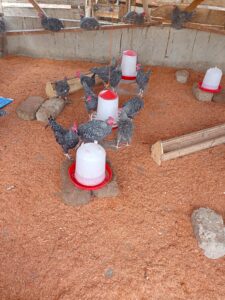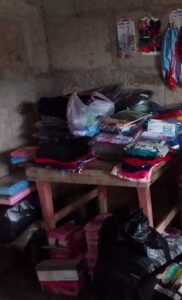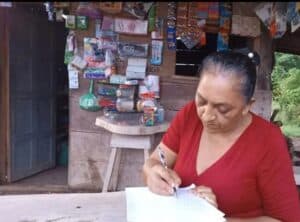Nkontomire named the District’s Best School in Agriculture at National Farmers Day
 At Self-Help, we take an integrated approach to rural development. If we wish to improve nutrition for our people, we must teach them how to grow more and better food. So as part of the annual plan to train farmers, our Young Adult Training Center (YATC) team coordinates with the School Feeding Program team to schedule informational training sessions about the benefits of cultivating and consuming Quality Protein Maize for representatives of schools active in the school feeding program. Individual farmers from those same communities are also invited to ensure that the community is food secure and not dependent on Self-Help’s interventions long-term.
At Self-Help, we take an integrated approach to rural development. If we wish to improve nutrition for our people, we must teach them how to grow more and better food. So as part of the annual plan to train farmers, our Young Adult Training Center (YATC) team coordinates with the School Feeding Program team to schedule informational training sessions about the benefits of cultivating and consuming Quality Protein Maize for representatives of schools active in the school feeding program. Individual farmers from those same communities are also invited to ensure that the community is food secure and not dependent on Self-Help’s interventions long-term.
So last March, more than a dozen farmers gathered at the training center to learn about conservation agriculture practices, particularly in the context of maize cultivation. Farmers were trained on land preparation (weeding and herbicide application), sowing, applying fertilizer, weed control, harvesting, and precautions on grain storage.
Emmanuel (pictured) was one of those present. He is a 34-year-old teacher tasked with teaching agriculture at Nkontomire elementary and junior high school. He is from Abuakwa, and travels 14 km to school each day where he teaches, among other classes, the “Integrated Science” course at the junior high school level, and heads up cultivation of the school garden.
For his efforts on behalf of the school, he received the prestigious National Farmers Day Award for Best School in Agriculture, Atwima Nwabiagya District in December 2016.
The Self-Help International Ghana staff have always known him to be an eager learner; he constantly researches new methods in farming at the YATC and shares his experiences with his co-farmers to all who are interested with the with new methods they put into practice. However, his story was of a different one before Self-Help International existed in his community.
Before starting this teaching position, Emmanuel had no previous background in agriculture, especially crop production. He had participated in a seminar organized by a group called Filicon Consult, where he was introduced to livestock production. The school had previously not been able to establish a farm, which made it difficult to teach methods through demonstration plots. In the past, another nonprofit had decided to initiate a school feeding program through acquiring land to grow the necessary ingredients, hoping it would provide the teachers with a way to experiment. However, the program failed to cultivate the land properly.
Self-Help International was invited to Nkontomire in hopes that Self-Help’s school feeding program would succeed since it incorporated greater training for adults and youth on cultivation methods. Self-Help’s school feeding program team supplied the school inputs such as maize seeds, weedicide, and fertilizer every cropping season to ensure abundant production, and the Parent-Teach Association members and junior high students began cultivating the school garden plots using conservation tillage practices.
Fast forward to today, the school is now able to produce about 200 kg of grain per production. Because he demonstrated such dedication and motivation, Emmanuel was invited to participate in the agricultural training organized at the Youth Adult Training Center. By applying the efficient and cost effective agricultural practices he learned at the training center, he enhanced the school’s repuation and earned the distinguished National Farmers Day award. When receiving the award, he credited his success to the Self-Help International team for their unflinching support towards young farmers.
This success motivates me and the rest of my team in Ghana to continually provide knowledge to young and new farmers and schools. To increase the number of the people we serve, YATC has decided to reach out to beneficiaries in several communities this year to teach conservation farming, which could lead to a reduction in production cost, and promote sustainable methods of food production to feed the growing world’s population. Thank you for your ongoing support of the farmers we serve.

 Previous Post
Previous Post


